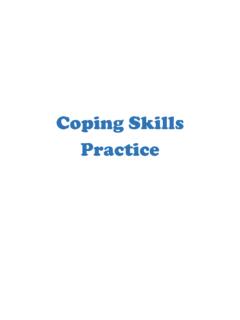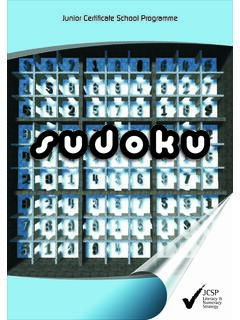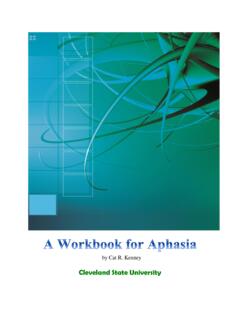Transcription of Personal Best B1 Student's Book UK S&S - Richmond ELT
1 UNIT. 1 Communication LANGUAGE present simple and continuous; action and state verbs communication 1A Connected 1 How do you keep in touch with people? Order the communication phrases from 1 (I do this less often) to pi ew nte g 6 (I do this most often). Compare your answers in pairs. co vi o in t ed o n e re e c ish . or ly ld get a text share a photo give someone a reply to an email check your comment on a n t b er pl bl so message call phone post no ch m Pu Go to Vocabulary practice: communication, page 136. 2 Think of three people in your life. Tell your partner how you keep in touch with these people. 3. nd A Are sentences 1 6 true (T) or false (F)? Discuss your answers in pairs. 1 We speak to each other face to face more nowadays. m r ee o 2 Our phone calls are longer today compared to ten years ago. 3 These days, it seems we prefer text messages to phone calls. sa d fo fr m 4 People in the USA send more letters and parcels nowadays. At the moment, we are sending a million emails per second.
2 An is is ich 5. 6 More than half of the internet pages we visit are social media sites. B Read the text and check your answers in 3A. Correct the false sentences. Th R. a We talk to each other less. ay te . Ten years ago, 80% of our communication was face to face. Now, it's only 60%. Even our phone calls are shorter on average, each call now lasts one minute, compared to three minutes ten years ago. It seems that people prefer texting to calling. We use traditional postal services less. In the USA, over 200 billion letters and parcels were sent in 2008, compared to 150 billion last year. These days, we usually write to people by text, messaging app or email. In fact, at this very moment, people are sending two million emails per second! We love social media. 60% of the pages we view on the internet are social media pages, and we share nearly two billion photos on them every day. The average person has five social media accounts and spends about two hours a day looking at them. THE CHANGING FACE OF.
3 Comments Tina COMMUNICATION It's a shame we don't write letters much, but the postal service seems so slow nowadays compared to communicating online! I need the internet to be in immediate contact with people, Methods of communication have never changed especially at the moment because I'm organizing my wedding. so much in such a short space of time. We Rob I agree with Tina, but I still try to send letters and cards on look at the results of recent surveys that tell us important occasions, and postcards when I'm on holiday. I. about the changing face of communication. don't know how people organized things with just snail mail! 4 Pe 642367 _ 4 20/6/17 11:56. present simple and continuous; action and state verbs communication LANGUAGE 1A. 4 Which piece of information in the text did you find most surprising? Do you agree with Tina and Rob? 5 A Look at the highlighted verbs in Tina's comment and answer the questions. 1 Which four verbs are in the present simple? Which verb is in the present continuous?
4 2 Which two verbs describe actions? Which three verbs describe states? B Choose the correct options to complete the rules. 1 We use the present simple / continuous to talk about things that happen regularly or things that are always true. 2 We use the present simple / continuous to talk about actions that are happening now or actions that pi ew nte g are temporary. 3 We can't use the present continuous for action / state verbs. co vi o in t 6. ed o n Read the Grammar box. Then look at the sentences in exercise 3A again. Do they contain action or e re e c ish state verbs? What tense are they? . or ly ld Grammar present simple and continuous; action and state verbs n t b er pl bl so Present simple with action and state verbs: no ch m Pu I call my brother at least once a week. I'm so thirsty right now. I need some water. NOT I'm needing some water. Present continuous with action verbs: I'm calling you from New York! We're studying French this year. nd Go to Grammar practice: present simple and continuous; action and state verbs, page 112.
5 M r ee o 7 A Pronunciation: sentence stress Listen to the sentences. Do we stress the auxiliary sa d fo fr m verbs be and do? 1 Are you trying to access the internet? 3 The internet doesn't seem slow at the moment. an is is ich 2 Do you need a new laptop? 4 Why are you using my tablet? B Listen, check and repeat. Th R. a 8 A Complete the sentences with the correct tense of the verbs in brackets. ay te . 1 I (not check) my text messages when I'm having a coffee with friends. 2 The price of desktop computers (go) down at the moment. 3 I (like) looking at the selfie photos that my friends post on social media. 4 At the moment I'm studying English online, so I (need) the internet on my phone. 5 I (look) for a new phone because my phone is very old. 6 Most people (have) friends on Facebook that they never talk to face to face. B In pairs, discuss the sentences in 8A. Which sentences do you agree with or are true for you? Go to Communication practice: Student A page 156, Student B page 166.
6 9 Complete the questionnaire and discuss your answers in pairs. How do you communicate? 1 When I want to meet up with friends, I normally 4 On my best friend's birthday, I usually send . message them on Facebook. text them. a message on social media. a text. a card. call them. 5 I usually share important photos . 2 When I'm feeling happy and I want to share good news using a messaging app. by email. with people that live far away, I on social media. send a text message. send a letter. 6 When I want to keep in touch with old friends, I usually . arrange to meet up. contact them on social media. email them. 3 When I'm feeling sad, I prefer to speak to people give them a call. on the phone. on Skype. face to face. Personal Best Write four sentences with state verbs in the present simple. 5. 642367 _ 5 20/6/17 11:56. 1 SKILLS READING skimming a text actually, in fact 1B Smart living? 1 What do you use your smartphone for? What do you think of people who constantly check their phones? Skill skimming a text Before you read a text in detail, get a general idea of the topic of the pi ew nte g text and of each paragraph.
7 Co vi o in Read the title of the text and look at any images. Can you predict t what the text is about? ed o n e re e c ish Quickly read the first paragraph. This will confirm the topic and can . or ly give you an idea of the text content and organization. ld Read the first sentence of each paragraph. This can give you n t b er pl bl so information about the main idea of each paragraph. 2. no ch m Pu Read the Skill box. Then look at the title of the text, the picture and the first paragraph on page 7. Do you think the writer had a positive or negative experience without his smartphone? nd 3 Read the first sentences of paragraphs 2 6. What is the main idea of each paragraph? Match the paragraphs with ideas a e. m r ee o a With no smartphone, he felt less tired. d There were more advantages than disadvantages. sa d fo fr m b He worked better. e He found things to do to entertain himself. c He communicated more face to face. an is is ich 4 Read the complete text. Are the sentences true (T) or false (F)?
8 Correct the false sentences. 1 The writer stopped using his smartphone because of an article he read. Th R. 2 Normally his smartphone distracts him when he's working. a 3 He has become a better listener when he's with friends. ay te . 4 He doesn't enjoy reading books and newspapers any more. 5 The light from smartphone screens helps us to sleep. 6 The writer now uses his smartphone differently from before. 5 Read this sentence from the text. Which word is used to express surprise that something unexpected happened? I actually talked to people more and felt more connected to them, although we weren't in constant contact online.'. Text builder actually, in fact To say that something is surprising or unexpected, we can use actually or in fact: I was worried that I would be bored without my phone as entertainment, but actually I enjoyed it. I thought living without a smartphone would be hard , but in fact it was quite easy. Look! We can use actually at the start of a phrase, before a main verb, or after be.
9 We usually use in fact at the start of a phrase. 6 Read the Text builder. Match 1 4 with a d. 1 My friends say I'm addicted to my new smartphone. a but it was actually on yesterday, not today. 2 My teacher's surprised because b Actually, I don't use it as much as my old one. 3 Tim thought the film was on at this evening, c but in fact I'm staying at home. 4 I thought I was going away this weekend, d I actually passed the exam! 7 Could you live without your smartphone for a week? In pairs, discuss what you think the experience would be like. 6 Pe 642367 _ 6 20/6/17 11:56. skimming a text actually, in fact READING SKILLS 1B. A WEEK WITHOUT MY. smartphone pi ew nte g co vi o in t ed o n e re e c ish . or ly ld n t b er pl bl so by David Sharpe 1 no ch m Pu When I read that we spend three hours every day checking our smartphones, I was surprised. What 4 I was worried that I would be bored without my phone as entertainment, but actually I. nd was I missing in the real world when walking down enjoyed it I'd forgotten how much I love the street, lost in a virtual world of social media books and newspapers.
10 I'd also forgotten how m r ee o updates and videos of dogs on bicycles? I promised much I enjoyed doing Sudoku puzzles. I had sa d fo fr m myself I would use my smartphone less but it an app for that on my smartphone, but never didn't happen. But then my phone died and I had used it. Doing one every day in the newspaper an is is ich to wait a week for a new one. Would I survive? I felt a lot more special and it became part of thought it would be hard , but in fact it was quite my morning routine. My brain felt a lot easy and surprising in a good way for a number sharper and much more ready for the day Th R. of reasons! ahead as a result. a ay te 2 5.. The first consequence was quite amazing on the One completely unexpected consequence of not first day in the office without my phone, I was having a smartphone was that I slept so much thinking more deeply and concentrating more. I had better and felt more awake in the morning. At re-discovered my brain! Not having access to my night I relaxed with a book before going to favourite apps meant that I wasn't interrupted every sleep, instead of watching Netflix or reading five minutes by social media alerts, football scores the news on my phone.


